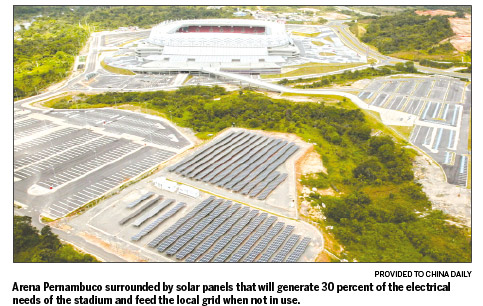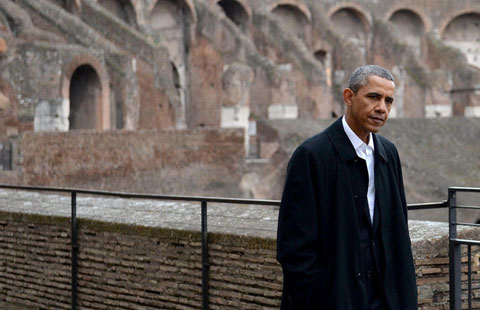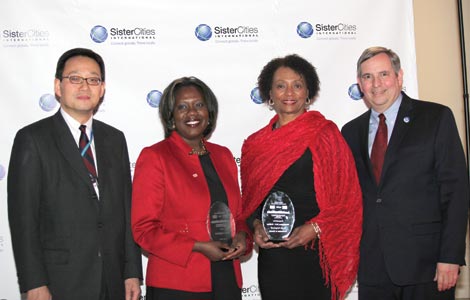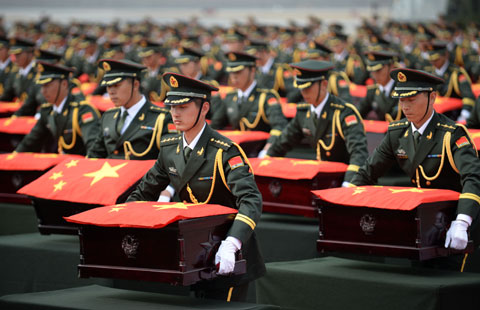Yingli and Brazil's Neoenergia partner up to provide clean electricity to Cup stadium
Updated: 2014-03-31 05:52
By Eliana Kirshenblat in New York (China Daily Latin America)
|
||||||||
Yingli Green Energy Holding Company Limited, known as Yingli Solar, recently announced they supplied 1 MW (megawatt) of solar panels to Neoenergia Group, one of Brazil's largest energy companies for the solar project at Arena Pernambuco, a FIFA World Cup Stadium which seats more than 46,000 people.
The first project of its kind in the state of Pernambuco, located in the suburbs of the Recife metropolitan area, in São Lourenço da Mata, Brazil, the project will provide clean electricity to Arena Pernambuco and meet 30 percent of its electricity demand.

Yingli Solar is the world's largest photovoltaic module manufacturer in terms of production capacity and shipments. Neoenergia is one of the largest privately held companies in Brazil and with its investments in five solar plants it is a pioneer in the solar energy movement.
With the flurry of infrastructure investment into Brazil leading up to the FIFA World Cup, Yingli and Neoenergia Group aim to create a project which will last long after the games are over. The system is projected to generate more than 1,500 MWh of electricity annually, which is equivalent to around 6,000 Brazilians' annual electricity consumption, according to Yingli's release on the project. When the stadium is not in use, the clean solar energy will be delivered to the local community's electricity grid through Brazil's net energy metering program.
The project — which includes the solar electric system, a visitors center to teach about solar energy, and sophisticated solar generation and weather monitoring stations to support solar energy research and development — is already far along, though not yet complete.
Jeffrey Barnett, vice-president of international sales at Yingli Green Energy Americas told China Daily in an email that, "Construction on the solar electric system is already complete, and the power plant is now energized and connected to the utility grid. The visitors' center will be completed in a later phase of the project."
Including educational and research centers with the project is part of Yinlgi's and Neoenergia Group's commitment to expanding clean energy across Latin America. Liansheng Miao, chairman and CEO of Yingli Green said in last week's release that "thanks to its prominent location next to the stadium, this 1 MW project will raise the profile of solar energy considerably during the FIFA World Cup, helping to bring our message of affordable green energy to the people of Brazil and football fans worldwide."
Yingli Solar is not new to the Latin American market. Yingli first opened shop in Brazil in 2011 with a branch company in Sao Paulo. They have been sponsors of the FIFA world cup since 2010. They were both the first renewable energy company and the first Chinese company to become a FIFA sponsor.
Yingli has been involved in the Arena Pernambuco project with Neoenergia Group since December 2013. "Neoenergia Group, a customer and partner of Yingli's in Brazil, is the owner of the project at Arena Pernambuco," Barnett said. "The high-performance monocrystalline PANDA Series solar panels supplied for this project were manufactured in China." Barnett told China Daily that so far Neoenergia has invested approximately $4.4 million in the project.
The array of Yingli solar panels can be seen from the stadium stretching far into the surrounding landscape. When visitors descend on Brazil for the FIFA World Cup in June they will be able to see a very visible statement of green energy commitment. To be exact, the project is visible over 15,000 square meters of land in Sao Lourenço de Mata and shows off 3,650 monocrystalline PANDA Series panels.
By completing high profile projects like Arena Pernambuco, Yingli Solar and Neonergia Group hope to drive demand for clean technology across Latin America.

 Xi watches China-Germany youth football match in Berlin
Xi watches China-Germany youth football match in Berlin
 Participants run for color
Participants run for color
 Indian air force cargo plane crashes, killing 5
Indian air force cargo plane crashes, killing 5
 Highlights of the Baselworld 2014
Highlights of the Baselworld 2014
 Obama tours the Colosseum
Obama tours the Colosseum
 Green Snake premieres in DC; an enchanting mystery
Green Snake premieres in DC; an enchanting mystery
 Trans-Pacific-City, State bonds celebrated
Trans-Pacific-City, State bonds celebrated
 Remains of Chinese soldiers in Korean War return
Remains of Chinese soldiers in Korean War return
Most Viewed
Editor's Picks

|

|

|

|

|

|
Today's Top News
Xi pledges to bolster ties with Belgium, EU
No substantive findings for MH370
Fujian relaxes one-child policy
Overseas returnees vie for jobs
Putin calls Obama to talk Ukraine
China, Germany to build yuan center
Turkey labels YouTube leak a 'plot'
DPRK lashes out at ROK 'gangsters'
US Weekly

|

|







